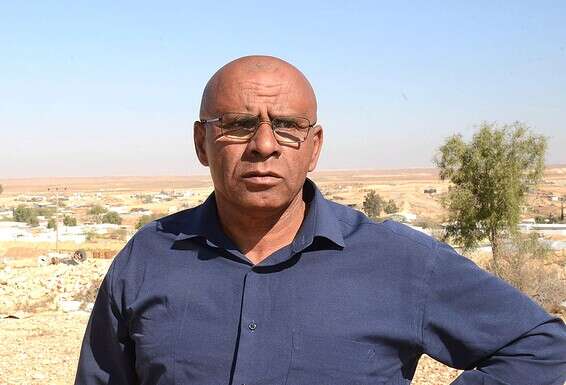A horrifying rape of a 10-year-old girl at her Negev home in the middle of the night and a recent breach of the perimeter of Nevatim Air Force Base by a suspected thief fleeing the police have prompted renewed discussion about the lawlessness in southern Israel. But these two cases are only the tip of the iceberg when it comes to break-ins by members of the Bedouin community in recent weeks. It seems they are becoming more audacious and taking bigger risks than they used to.
Follow Israel Hayom on Facebook and Twitter
This is a quick run-down of the last few weeks of criminal events in the Negev: On Jan. 2, more than 90,000 bullets were stolen from a bunker at an IDF training base at Tze'elim – over a ton of ammunition that was taken in a sophisticated, well-organized operation. On Jan. 6 a vehicle was stolen from the Tze'elim parking lot, caught by security camera. A tracking device helped police locate the vehicle near the Bedouin village Bir Hadaj. On Jan. 17, a group of Bedouin were arrested for throwing rocks at Tze'elim base, and on Jan. 20 a drill at the base was halted because Bedouin had penetrated the range of live fire. On Feb. 3 communications equipment were stolen from a container at Tze'elim. On Feb. 5, general military equipment was stolen during break-in at the Natan Camp near Beersheba; and on Feb. 7 more ammunition was stolen from the Sde Teiman Base. During the last incident, the thieves throw a stun grenade at the soldiers.
The peak came in the incident at Nevatim, when a suspect who was fleeing police breached the secure Israeli Air Force base and spent hours there. Not only the military is suffering – civilians are increasingly the targets of crime. At the start of this week, the Israel Police reported that it had arrested a ring of suspects responsible a number of break-ins at Israeli homes in the Negev. In one incident, the robbery turned into a sexual assault on a little girl who was asleep in her room
Residents of the Negev are increasingly distressed at the growing crime, and the issue is frequently discussed.
"The feeling is that there is total lawlessness," a number of Negev residents tell Israel Hayom. "If the great IDF can't manage to protest itself, is it any wonder that they [Bedouin criminals] come to private homes and do whatever they want?"
Others lay it out plainly: "There is an atmosphere of degeneration and fear, a feeling that is growing stronger because of the COVID crisis and the sense of uncertainty that is hanging over everyone, anyway."
IDF reservists called up to train in the area express similar feelings.
"I won't drive my car to [reservist] training anymore," says Arik Greenstein, a reservist in the Armored Corps and the leader of a protest movement by reservists who are calling for an end to lawlessness at Tze'elim.
"My friends had cars stolen, and that's just a drop in the bucket. We're helpless against practiced thieves who are just getting more daring. If one guard at night used to be enough, today we need to have four, and even that doesn't help. Their audacity is something else," he says.
Greenstein directs his criticism at the IDF leadership. "Why is the guard on duty always blamed, even though no one gives him the tools to protect himself? Why doesn't the chief of staff grab the commander of Tze'elim and the Southern Command by the ears and scream at them that this situation won't go on? Morale is being hurt. How can we win a war if we can't beat a bunch of thieves?"
A relatively new phenomenon
Discussions with high-ranking officers and older soldiers reveal that crime of this type is a relatively new phenomenon, having popped up in the last two decades. In the past, it was customary to execute an arrest protocol during guard duty at army bases, especially when guarding ammunition stocks. The protocol entails calling upon the suspect to identify themselves, firing shots in the air, and eventually firing at the suspect. The protocol was exercised so frequently that in May 1995 a guard on duty at the ammunition warehouse at a paratroops base at Beit Lid fired at a squad of soldiers heading in his direction during a training drill, killing Lt. Yiftach Ottolenghi. Since then, open-fire protocol has been changed, and guards do not carry out the arrest protocol in cases like these. As incidents began to mount, and public criticism along with them, regulations were changed again in 2017 to allow a guard who spots a real-time theft of weapons to carry out the arrest protocol. However, guards are not allowed to arrest suspects spotted stealing ammunition.
Subscribe to Israel Hayom's daily newsletter and never miss our top stories!
The Bedouin are worried, too
In an attempt to try and understand what has been happening at Tze'elim Base in the past few years, Israel Hayom spoke with the base's former deputy commander, Col. (res.) Yochai Ben-Yishai, who retired from the army in 2013.
"When I took on the role in 2011, the phenomenon was already at its height," he explains. "Almost every weekend people from the area would go into the area around the bunker [ammunition warehouse], find a spot far away from the guards, and steal whatever they could," he says. The bunker was outside the base, and even though a smart fence had already been built around the base itself, the ammunition was exposed.

The first thing Ben-Yishai did was take action to "stop the bleeding."
"When I understood it, I brought in an excavator to dig a deep channel around the bunker. I said, first of all, I'll solve the problem so it won't happen on my watch, and it really did lower the number of break-ins, but I knew it wasn't a long-term solution. It was clear that it wasn't a real solution," he says.
In attempt to find a more comprehensive solution, Ben-Yishai set up meetings with everyone involved.
"I went to the headquarters of the IDF ground forces and we held a meeting with all the officials: the commander of the Southern District for the Israel Police, representatives of the public prosecutors, the Israel Nature and Parks Authority, the INPA's open spaces 'green patrol' and anyone who was involved in the slightest. We said, 'Guys, this is a problem. What do we do?'"
But Ben-Yishai discovered he was on his own. "I realized that no one wanted to help. Everyone would only bring up 'no's'. The public prosecutors said not to open fire and explained why not. The police said they had no personnel. The bottom line is, it didn't work. In the end, you find yourself standing on a hilltop alone and everyone tells you, 'Deal with it.' It's total lawlessness, all the authorities shrug it off."
So what should be done? According to Ben-Yishai, "The IDF should reinstate the use of the arrest protocol for every theft of weapons or breach of military areas. You can't have a situation in which people climb into a tank. You can't have a situation in which they go into a company tent and get into a fight with soldiers. Next, people will wind up being killed. Apart from that, the police and the public prosecutors should take a different approach. Governability can be restored quickly."
Like the IDF soldiers serving in the area and residents of Jewish communities in the Negev, Bedouin residents are also worried about the situation.
"What is happening is very sad. We absolutely condemn it," Staff Sgt. (res.) Salama Adisan, a village elder from Bir Hadaj, tells Israel Hayom. "We are against the young people stealing and committing crimes, it goes against our values."
The IDF is working to contain the problem
Adisan says that the problem is that other than enforcement, the government does not have any solutions for the distress of the Bedouin the Negev. "If I don't cause the population to trust me as a leader, I can't be a leader," he says.
"When they come to demolish someone's home and no one listens to [them], I'm not building trust among the residents and I can't promote anything. The government knows how to enforce among us, but not how to take care of us. I call on the state of Israel to listen to us. Have a round table, meet us halfway and find solutions to these problems," he adds.
The IDF, meanwhile, sees the need to contain base breaches as a top priority. In January, surprise visits were conducted at 52 camps to assess their state of readiness and the IDF's ability to defend the camps. Among other things, the inspections looked at how well the camps were defended against theft. In addition, the military is also investing considerable resources in technology initiatives that include a project to protect IDF weapons and ammunition stores and smart arsenals.
In response to the claims voiced in this article, the IDF Spokesperson's Unit said, "All the incidents described are being thoroughly investigated and handled by all the relevant authorities, along with the Military Police, which investigates each case separately. The ID takes these incidents seriously, and therefore Chief of Staff Lt. Gen. Aviv Kochavi convenes the General Staff once a month to discuss containing incidents of theft, with an emphasis on theft of weapons and ammunition from IDF bases. As part of the actions the IDF is taking to strengthen base security, in 2017 the open-fire protocol was changed. The change was made allows guards to arrest suspects caught taking weapons."
The Israel Police said in response: "As part of the ongoing fight against property crimes in the area, the police are working every day of the year to carry out increased enforcement, both open and hidden, against gangs and criminals, in cooperation with all the relevant authorities."




